The First Official Brant Pride
Mabe Kyle, The County of Brant
Project Description & Goals
Queer Country Crossroads will create a multimedia oral history storytelling project where Mabe interviews multiple rural 2SLGBTQIAP+ folks on their lived experiences. This project will share their stories in different formats and through other platforms they feel comfortable with to amplify their voices. The project’s final goal is to create a documentary and a book with photography, interview transcript text, and the Changemaker’s reflections on the project. In addition, Mabe hopes to host zine-making workshops for youth to create and distribute a “rural queer survival guide” to libraries and at public pride events in rural Ontario.
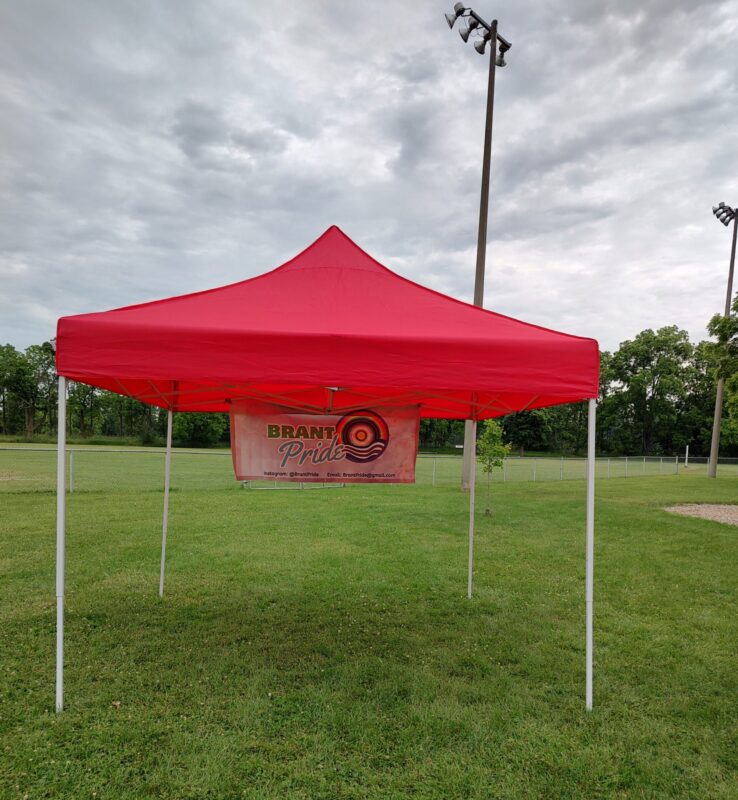
Highlights, Successes, Challenges & Impacts
“This past year, I had the honour of being part of 8 80 Cities Ontario Community Changemakers program. Although my vision was slightly different heading into the project, I decided that my efforts to build community would be best spent creating the first official pride in the County of Brant municipality.” As a closeted transgender and unknowingly neurodivergent person, Mabe had struggled in this rural community growing up; however, their life circumstances changed in March 2020, and they were routed on an unexpected path to return home to live where they have spent the past four years.
Building community, especially for rural queer and trans folks, is something that has become quite important for them during this time. “With the support and funding of the OCC program, I knew I could create something that would have a significant impact. In the previous two years, they had spent much time attending rural prides across the province. At the time, there hadn’t been an official pride event in the County of Brant,” they reflect.
If they were to make this their project for the year, they knew it wasn’t something they could take on alone. They recruited some other 2SLGBTQIA+ folks doing incredible work in the community to join them in these efforts. Together, they put on a community consultation in December to see what types of events folks would like to see, as their vision was to make this by and for the community. It was a successful event, with about 20 folks in attendance. During the winter, the committee met monthly to discuss and make plans for their inaugural pride season that would host one event per month from May to September with one event in every ward of the county on different themes, including history, nature, spirituality, creativity, and joy which were themes based loosely off of the original pride flag colours. In March, they presented their ideas to the County of Brant council, passing a unanimous motion to support them with their events. They also tabled at a Skate with Pride event at the Brant County Sports Complex that was being put on by the health unit in collaboration with other organizations that support 2SLGBTQIA+ folks in the Brantford and Brant area.
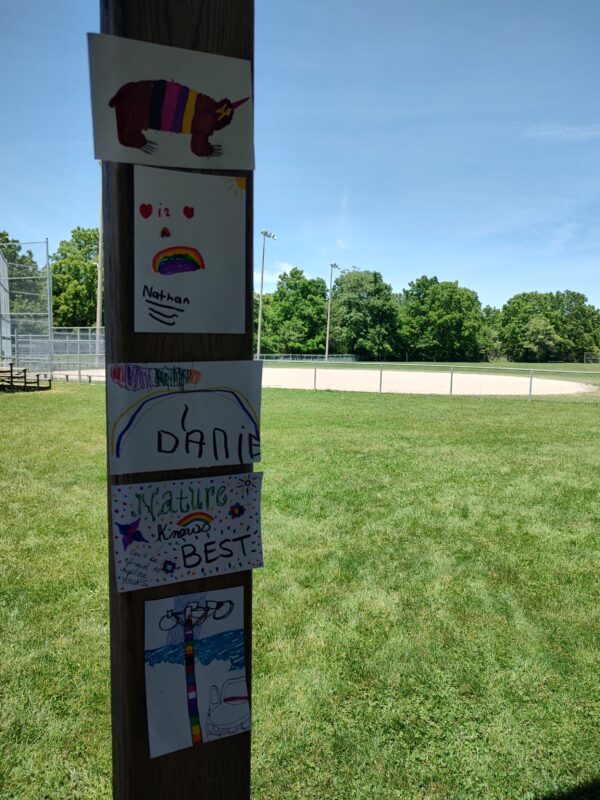 There is one high school in the county of Brant, located in Paris, and it is the high school that Mabe and a few other committee members attended. Mabe had been in conversations with the Panther Pride group at PDHS since last June and wanted to work with the youth there in some capacity through the community work that they were doing. The teacher liaison mentioned that the students wanted to see more pride events within the county. Together, the Brant Pride committee worked with the Panther Pride group to organize our first event in May. The event was a huge success, with around 30 guests in attendance, many of whom were alumni returning to the high school for the first time in years. Speakers were giving short talks on different history themes, including the local 2SLGBTQIA+ community, the history of queer community care, the impacts of colonialism on the 2SLGBTQIA+ community, Two Spirit identities, and the high school students had briefly spoken about a beautiful display they had put together about the history of the Panther Pride Group / GSA / QUEST group that had existed at the high school since 2010. BRISC, the regional Indigenous Friendship Centre, generously provided refreshments for the event, which folks enjoyed before the second portion, a panel of 5 transgender people, one gender-affirming care doctor, and themselves as moderator. The event felt like a reclamation and a homecoming for me.”Seeing the joy radiating from the folks in attendance was very impactful. It indicated to me how far I had come in the decade since attending this school regarding my personal growth and confidence as a queer and trans person to be putting this event on for my community, making my dreams come true in ways beyond my imagination.
There is one high school in the county of Brant, located in Paris, and it is the high school that Mabe and a few other committee members attended. Mabe had been in conversations with the Panther Pride group at PDHS since last June and wanted to work with the youth there in some capacity through the community work that they were doing. The teacher liaison mentioned that the students wanted to see more pride events within the county. Together, the Brant Pride committee worked with the Panther Pride group to organize our first event in May. The event was a huge success, with around 30 guests in attendance, many of whom were alumni returning to the high school for the first time in years. Speakers were giving short talks on different history themes, including the local 2SLGBTQIA+ community, the history of queer community care, the impacts of colonialism on the 2SLGBTQIA+ community, Two Spirit identities, and the high school students had briefly spoken about a beautiful display they had put together about the history of the Panther Pride Group / GSA / QUEST group that had existed at the high school since 2010. BRISC, the regional Indigenous Friendship Centre, generously provided refreshments for the event, which folks enjoyed before the second portion, a panel of 5 transgender people, one gender-affirming care doctor, and themselves as moderator. The event felt like a reclamation and a homecoming for me.”Seeing the joy radiating from the folks in attendance was very impactful. It indicated to me how far I had come in the decade since attending this school regarding my personal growth and confidence as a queer and trans person to be putting this event on for my community, making my dreams come true in ways beyond my imagination.
Having the guidance and funds I needed to do this was the best part about being an Ontario Community Changemaker for me,” they say.
The second event they hosted was a nature hike and picnic in a smaller rural community in the County of Brant, Mount Pleasant. The weather was beautiful on this day, and about 20 people and a couple of dogs came out to enjoy sandwiches and take a stroll on the nearby trail. They had different activities, such as a reading station, a writing and colouring station, and a selfie station. The folks who came out to this event also enjoyed their day in fellowship with other community members. They feel these events reminded them how beautiful their community is, both the 2SLGBTQIA+ community and the community of the County of Brant. They feel very grateful for the support from my incredible co-chair, the other folks on the pride committee, the Panther Pride group at PDHS, the people in their lives, and everyone who attended the events to be in the community together.
I am looking forward to what the next few months and few years bring for Brant Pride with our remaining events in our inaugural pride season. As I finish writing this report I am reminded of the Margaret Mead quote “Never doubt that a small group of thoughtful, committed citizens can change the world; indeed, it’s the only thing that ever has.” Perhaps these events didn’t change the world however I believe they did change my community for the better and putting a year’s worth of work and dedication into organizing the events and seeing a dream come into reality made every moment of this journey worthwhile.
About Mabe
Mabe Kyle is a disabled queer white settler who lives on their family’s farm on Anishnaabe, Haudenosaunee, and Attawandaron territory along the Haldimand Tract. They are a creative professional passionate about healing and self-expression who have practiced and honed their skills in six countries. With a strong foundation in social justice and leadership experiences, their open-mindedness and active engagement in continued learning give them a unique perspective on problem-solving and the development of communities. Mabe is an Expressive Arts Therapist in training and a peer support worker.
Food for Joy: Promoting Well-being and Inclusion in Little Jamaica
Micha Happie Edwards, Toronto
Project Description & Goals
Food for Joy: Promoting Well-being and Inclusion in Little Jamaica is a transformative community healing program that supports BIPOC individuals’ joy and mental well-being. Through playful food conversations, participants explore their relationship with food, culture, and identity, fostering connection and community.
Recognizing the necessity of joy, self-expression, and ease, participants engage in transformative conversations, healing and building confidence while developing a balanced relationship with food and identity. Collectively, participants address challenges and triumphs, fostering unity and shared purpose.
Promoting joy, mental well-being, and social inclusion, Happie Inner Quest uses food to uplift and strengthen individuals, fostering connection and belonging in the wider community.
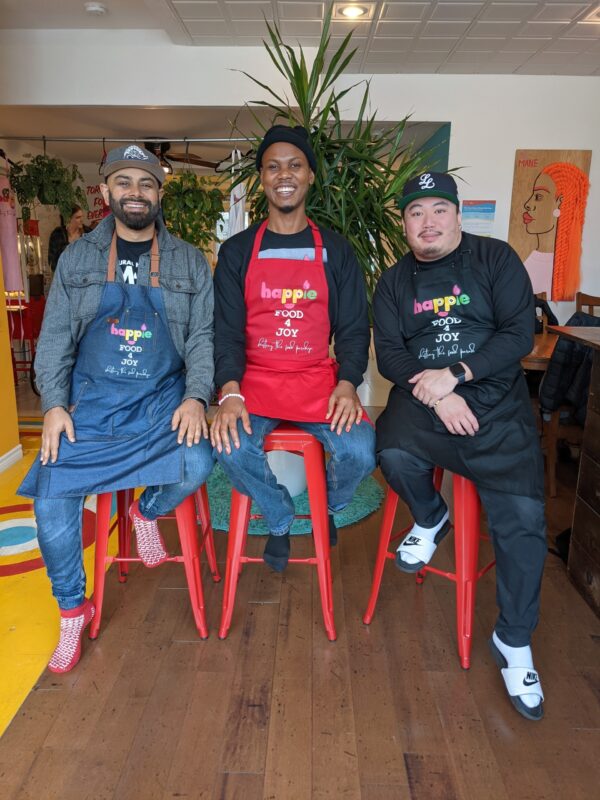 Highlights, Successes, Challenges & Impacts
Highlights, Successes, Challenges & Impacts
Micha shares the highlights, challenges, successes and impacts of implementing their project.
1. Sonic Story Audio Adventure:
An innovative highlight has been creating a sonic story audio adventure exploring joy and mental well-being using the narratives and stories told by community members using silent disco headsets. This project has uniquely blended technology, storytelling, and well-being, engaging participants in an immersive experience.
2. Happie Special at Earlas’ kitchen:
Introducing the “Happie Special ”, a plant-based meal for lunch at Earla’s Kitchen on Thursdays, has been a surprising gift. This comes from the commitment to creating aligned partnerships with delicious local meals for the community.
3. Cooking Cultural Food with Community Experience:
Recently, they explored Cooking with no agenda. Ugandan cuisine, led by community member Jedidiah, has been a standout moment. This has strengthened community bonds and provided a platform for sharing cultural heritage through food.
4. Collaboration and Community Engagement:
The project fostered meaningful conversations and collaborations with chefs, entrepreneurs, and creators. These discussions about transitioning from a survival mindset to a joyful food paradigm have been profoundly enriching and nourishing and have highlighted the community’s interest and support.
Successes
– Increased Awareness:
- The project has successfully raised awareness about the benefits of joyful eating and the importance of well-being through food.
– Innovative Approaches:
- Using innovative approaches like silent disco headsets for storytelling has added a creative dimension to the project, making it more engaging.
- The Guided Eating Meditation experience was well received. It supported community members in shifting their mindsets from survival to joy.
Challenges
- Communication: It has been challenging to settle on the most effective form of communication to convey the concept of shifting our food paradigm. Ensuring the message is clear, compelling, and resonates with the community requires continuous effort and adaptation.
The project successfully met its stated goals by engaging the community in meaningful ways around the themes of joy, well-being, and food:
Sonic Story Audio Adventure and Plant-Based Food Eating Meditation:
Creating a 45-minute Sonic Story Audio Adventure, combined with a plant-based food-eating meditation, effectively ignited community members’ taste buds and fostered nourishing connections. These activities highlighted the importance of joyful eating and well-being, aligning with the project’s core objectives.
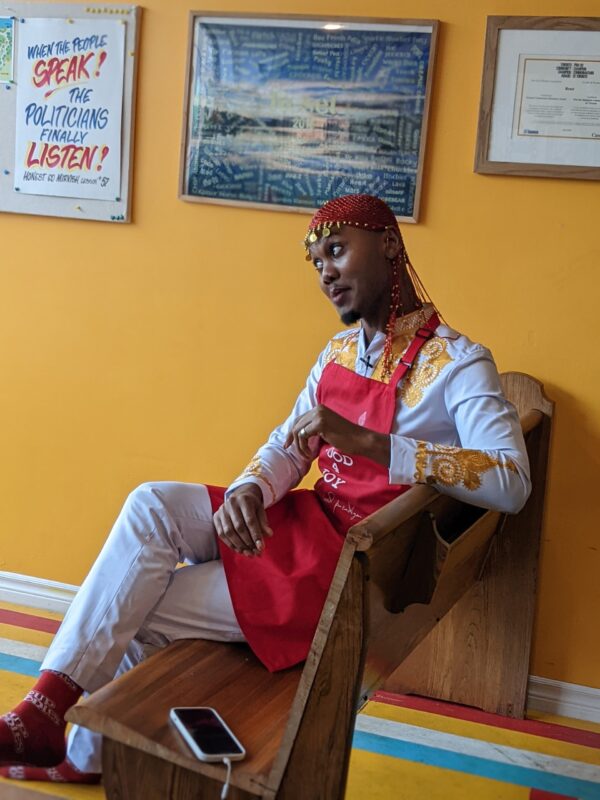 Art Installation Weekend and Care Practice Workshop:
Art Installation Weekend and Care Practice Workshop:
Following the Art installation weekend and the Sonic Stories inspired the project to further explore the concept of care through a workshop at the Reset Living Room. This workshop, led by Jedidiah, a Ugandan writer and friend, involved sharing stories about the food landscape in Uganda. The hands-on experience of shopping at a local Ugandan grocery in Little Jamaica and preparing a delicious Ugandan meal with the community enriched participants’ understanding and appreciation of diverse culinary traditions.
These activities met and exceeded the project’s goals by creating immersive and educational experiences that strengthened community bonds and deepened the understanding of food’s role in joy and well-being.
Happie Inner Quest significantly impacted the local community through key initiatives. It supported the local economy by sourcing food from local vendors and provided a youth work opportunity in videography, offering valuable skills and experience. Free programming for the economically stressed community ensured inclusivity and strengthened intergenerational bonds. By bringing in programming led by a queer artist, it promoted visibility and support for queer community members. The project focused on wellness, reducing stress and improving mental health. Additionally, it facilitated opportunities for community members to meet and build social capital, fostering a strong, supportive community.
Happie Inner Quest engaged with 30-45 community members through various activities. The project included 1 installation weekend, consisting of 1 opening night and 2 days of events, and 1 workshop. These events provided multiple touchpoints for community interaction, fostering connections and promoting the project’s goals.
Through the Happie Inner Quest project, I learned about the wholesome possibilities for connecting with the community through food relationships, particularly in culturally rich spaces like Little Jamaica. Witnessing the budding or blossoming of new possibilities for community engagement and well-being has been a profound experience, highlighting the power of food in fostering joy and connection.
When reflecting on opportunities for growth, Micha shares that they would like to approach marketing and initiatives differently. They would partner with more organizations that serve BIPOC communities to create more direct opportunities to reach and engage individuals who would appreciate and benefit from the work. This approach would enhance outreach and strengthen community connections.
The best part of being a changemaker was feeling connected with other youth changemakers and deepening my interest and curiosity in how cities are shaped and what contributes to cities for all.
I found it particularly rewarding to connect with native working principles and see opportunities to contribute to the city and the area I am growing to love.
About Micha
Happie is a self-taught Tkaronto-based Poet, Personal Growth Chef, and Speaker from rural Jamaica. Trained at Ontario’s premier culinary school, Micha spent a decade empowering people through food, fostering joy and nourishment. As the founder of HAPPIE, a company nurturing well-being and self-worth, Micha guides vision-driven entrepreneurs, artists, and innovators in aligning their food relationships for optimal living. Raised by a diabetic mother and having experienced his own gut health issues, Micha understands how lifestyle profoundly affects well-being. Seeking natural approaches to eating and healing, Micha shares wisdom to create a brighter world where individuals embrace their uniqueness without shame.
@happiemichaedwards
#socialinclusion #joyfoodculture #food4joy
The Tea Garden
Nicole Tanti, Belleville
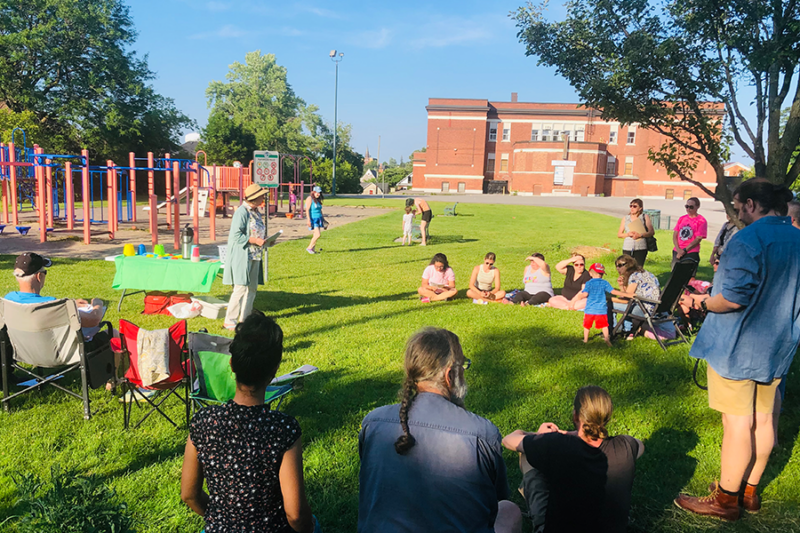
Project Description & Goals
The original intention of The Tea Garden was to engage the local community in an urban park in downtown Belleville. Community members use the park as a recreational, social and community space. It features community garden beds, two park benches, one picnic table and an outdated play structure that is partially damaged. Such an important community space sorely lacks amenities, landscaping, updated playground equipment, and general care. This is the only park in the area and is vital to the community.
Nicole Tanti’s project intention was to create an herbal tea garden in the park that featured edible and medicinal plants. The garden would be a space for people to engage with plants with their senses, learn about the healing properties of plants like chamomile, lemon balm, and peppermint, and bring people together outdoors to meet their neighbours.
Highlights, Successes, Challenges & Impact
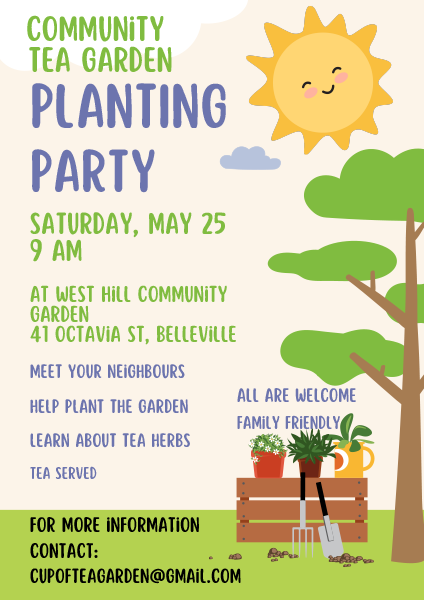 In May 2024, a community Tea Garden Party was held to celebrate the initiative. 30 community members of various ages attended the event, and they were able to plant 50 edible flowers and herbs in the community garden bed. Herbal tea made from tea garden herbs was served, a craft area was set up for people to paint garden rocks to decorate the park, and there were a lot of beautiful conversations between neighbours, some of whom had never met. Nicole also created a handmade zine that was distributed and featured information on many plants in the garden.
In May 2024, a community Tea Garden Party was held to celebrate the initiative. 30 community members of various ages attended the event, and they were able to plant 50 edible flowers and herbs in the community garden bed. Herbal tea made from tea garden herbs was served, a craft area was set up for people to paint garden rocks to decorate the park, and there were a lot of beautiful conversations between neighbours, some of whom had never met. Nicole also created a handmade zine that was distributed and featured information on many plants in the garden.
The reception was highly positive and became a catalyst for forming a community group that is now actively working to protect their park from development. The municipality is proposing to drastically reduce the size of the park space to build high-density housing on site. If this happens, large open playing fields, potential basketball/pickleball courts, and community garden beds would be lost, and much of the park would be gone.
Our community group has held two meetings so far, with much planning in between. The first meeting had over 25 attendees, including the Mayor of Belleville. The community could voice their concerns about the loss of park space, share the park’s significance and hear the Mayor’s perspective. We are now planning a petition that will be circulated locally and to present our concerns and vision for the park space at the City Council in the coming months.
The changemaker has contacted several community agencies about hosting workshops at The Tea Garden. “The wonderful thing about herbs is that they can appeal and connect to people of all ages and backgrounds. I hope to work with staff, volunteers, and clients of local agencies in a therapeutic outdoor setting with The Tea Garden to support healing and community building,” she says.
This project has taught me a lot about being adaptable and taking time to pause. At first, my goal was to have an in-ground garden built at the park, and while this would have been ideal in many ways, it proved to not be feasible. The City of Belleville offered to give the project a community garden bed in a wonderfully visible area of the park so this became the location of The Tea Garden. I hope that in the future the garden can be expanded into a larger and more permanent in ground addition to the park.
The future of the park space itself is unknown. Still, by being involved in the community group advocating for it, Nicole hopes to share the community’s interest and the importance of establishing a healing garden as a permanent fixture in the park landscape.
Another key learning for the changemaker was pausing and not rushing into decision-making. I was able to take a step back when needed to evaluate and reevaluate the project based on my abilities, community members’ feedback, and logistical considerations.
This Ontario Changemakers program is truly unique and wonderful in its flexibility, trust and support to Changemakers. I appreciated having support from Shannon at 8-80 Cities during the year and having the flexibility to pivot my project. The in-person Change Maker studio was very inspiring. It was a way for me to learn different tools to apply to my project, meet inspiring people and gain confidence to dig into my project. I am truly grateful for the opportunity and know this is the beginning of something more significant in the community.
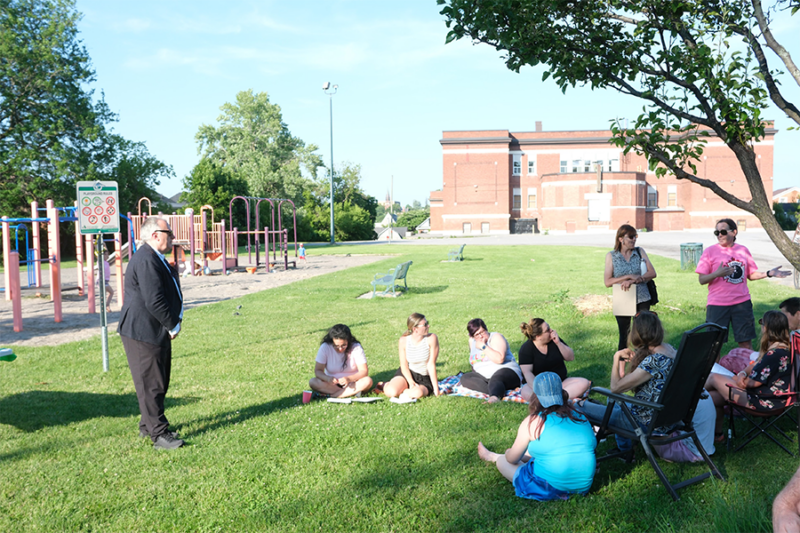 About Nicole
About Nicole
Nicole is passionate about the healing power of plants and their ability to support growth, healing and connection in the individual and collective experience. Utilizing her background in horticulture, community art and social justice; she has been privileged to work with people of all ages in diverse community settings. She has coordinated children’s gardens on Toronto Islands and High Park, worked as a community educator teaching topics including food skills, gardening and nature connection, painted murals with children as a community artist and teaches yoga and meditation with organizations such as SickKids.
#socialinclusion #publicspaceactivation
440 Parkside Collective
Rebecca Beaulne-Stuebing, Toronto
Project Description & Goals
The 440 Parkside Collective is an Indigenous-led land restoration and community-building project in High Park in Toronto. The collective developed from relationships formed through the Asemaa Circles project and the Indigenous Land Stewardship Circle. The 440 Parkside Collective is a group of community members who work together to care for a 10,000-square-foot space, collaboratively growing and harvesting medicines while organizing community learning and work sessions, sacred fires, feasts, and other gatherings in accordance with lunar and seasonal cycles.
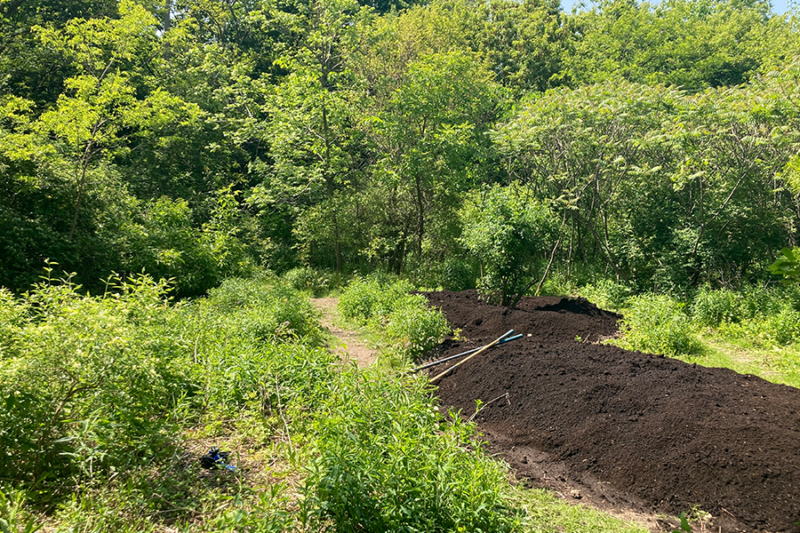
Highlights, Successes, Challenges & Impacts
For the Toronto-based changemaker, the support through the microgrant went far in helping to strengthen and expand the 440 Parkside project. As part of the reflection about what went well and what could have gone better, Rebecca shares her vulnerability while experiencing some major health issues which impacted her capacity to participate actively in the OCC process.
As it is an ongoing project, the goals are long-term and seasonal. As 2024 marked the 5th year of this project, which continues to develop and evolve, it has been a fantastic experience to learn about what community participation, engagement, and leadership can look like in the context of an urban Indigenous land restoration project. In 2024, several new members joined the collective (Indigenous young people/young adults), and several events were held for the community in addition to ongoing work to learn more about ecological monitoring, Indigenous planting and growing methods, Anishinaabemowin, and other land-based skills.
They hold weekly team meetings throughout the year (1 hour each week). Approximately 12 members of the ‘core team’ collective and an additional network of about 50 volunteers. They have a broader contact list (folks who have signed up to receive updates regarding events and work days) of over 75 people : )
Implementing this project has helped me learn how to set boundaries, in my community work, to ensure I am building a life and relationship to work that will be sustainable through my whole life!
Reflecting on growth opportunities, Rebecca mentioned she would try not to do absolutely everything and be more patient with herself.
The best of being a changemaker was connecting with another Metis young person!
About Rebecca
Rebecca Beaulne-Stuebing is Métis, with maternal family roots in Sault Ste. Marie Métis community and Manitoba. She is also of Austrian settler ancestry through her father’s family. Rebecca completed a PhD in social justice education and Indigenous health at the University of Toronto and collaborated on several community projects.
#socialinclusion #activatepublicspace